5901LHS - Language & Communication for Business: An Essay
VerifiedAdded on 2023/06/10
|7
|1407
|115
Essay
AI Summary
This essay explores the pivotal role of English in international business, particularly in the context of Australia. It begins by examining the importance of English as a common language in global trade and communication, referencing the work of Rogerson-Revell and its relevance to the Australian business environment. The essay highlights the benefits of using English as a lingua franca, such as promoting cooperation and streamlining communication across diverse linguistic backgrounds. It also acknowledges the challenges faced by non-native English speakers, including language barriers and potential feelings of alienation in business meetings. The essay draws on the work of Aichhorn and Puck to analyze these challenges, suggesting that while English facilitates international collaboration, it can also create inefficiencies and communication difficulties for those less fluent in the language. The conclusion reinforces the significance of English as a global business language while acknowledging the need to address the linguistic and cultural nuances that arise in international business settings.
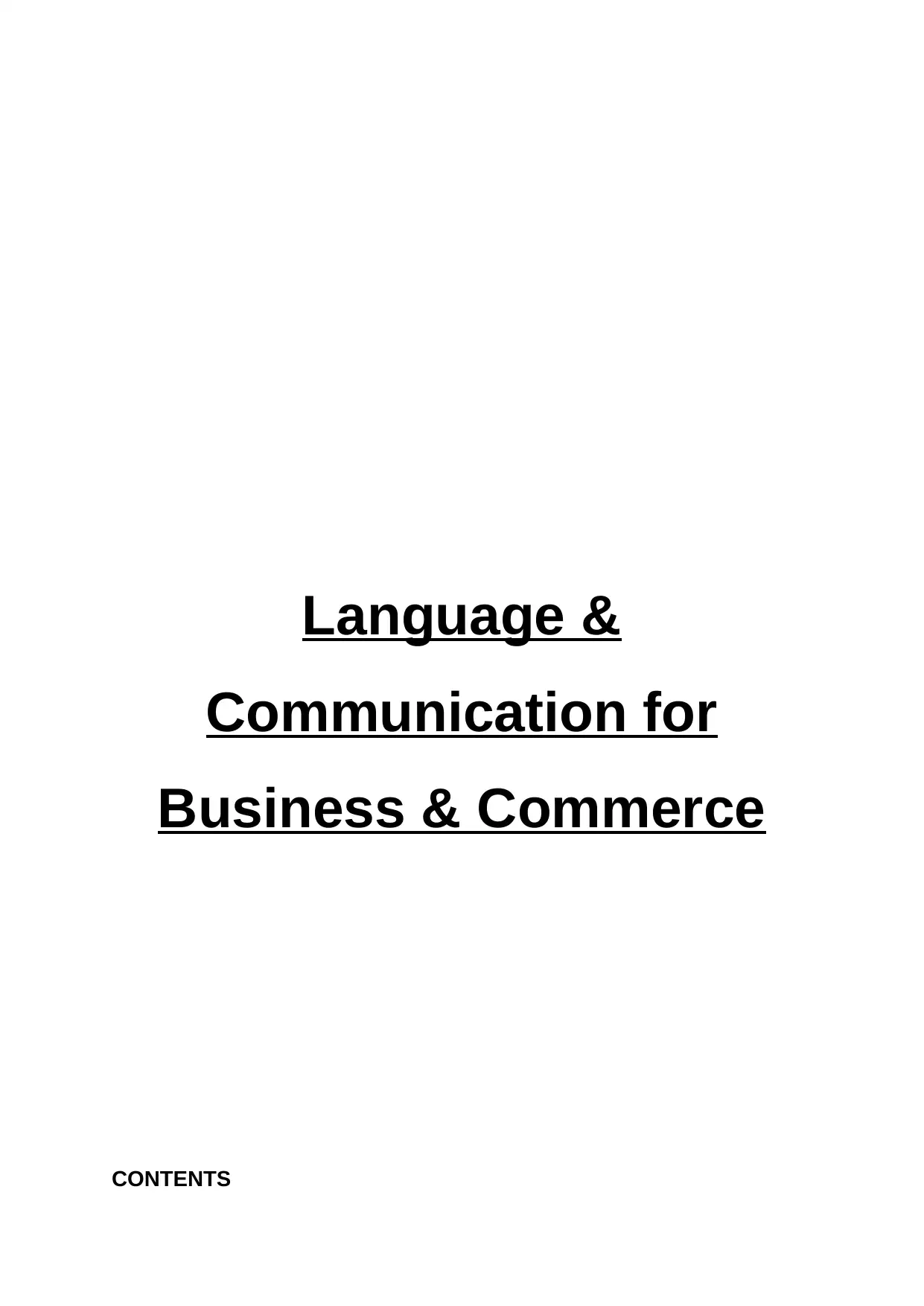
Language &
Communication for
Business & Commerce
CONTENTS
Communication for
Business & Commerce
CONTENTS
Paraphrase This Document
Need a fresh take? Get an instant paraphrase of this document with our AI Paraphraser
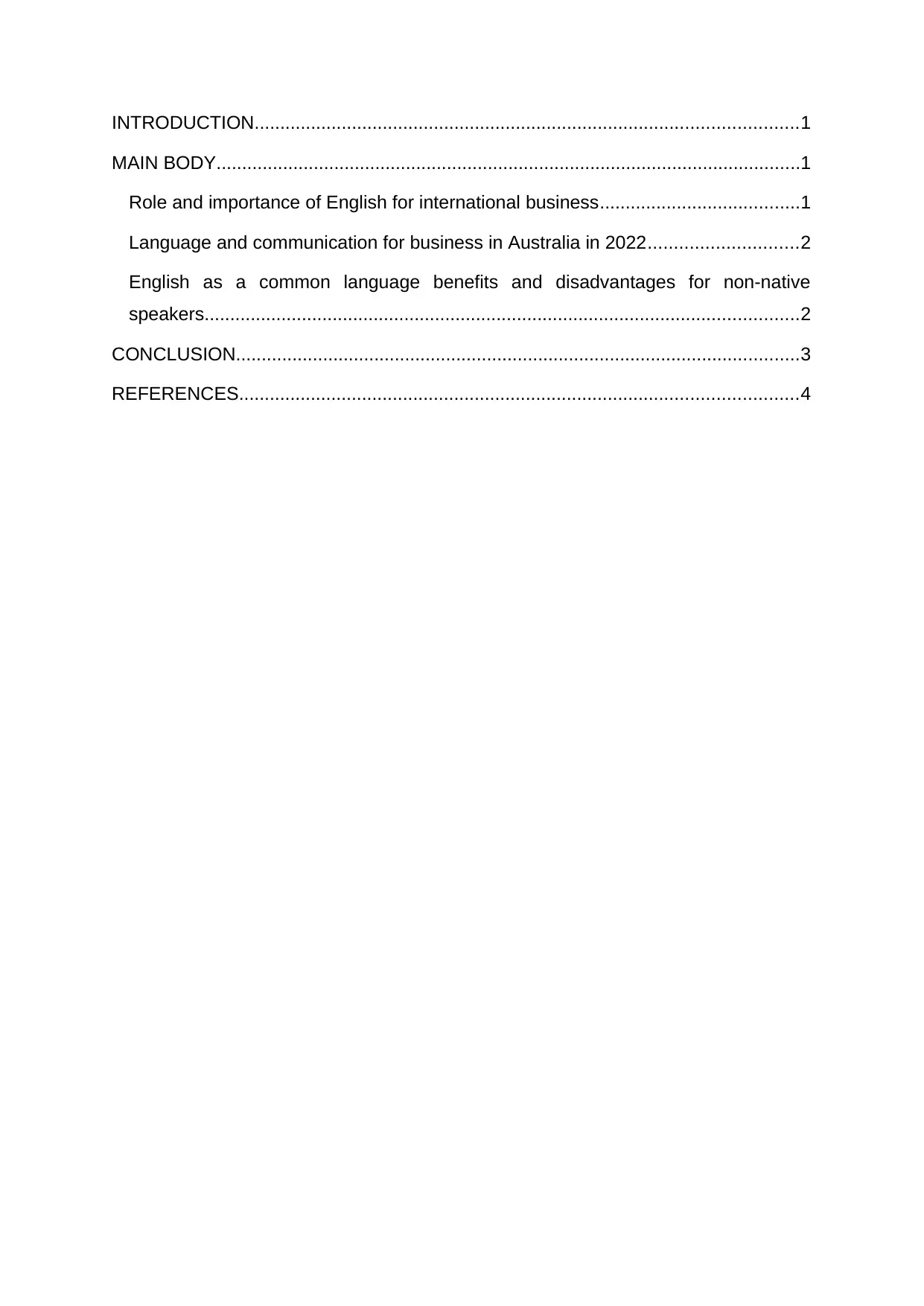
INTRODUCTION..........................................................................................................1
MAIN BODY..................................................................................................................1
Role and importance of English for international business.......................................1
Language and communication for business in Australia in 2022.............................2
English as a common language benefits and disadvantages for non-native
speakers....................................................................................................................2
CONCLUSION..............................................................................................................3
REFERENCES.............................................................................................................4
MAIN BODY..................................................................................................................1
Role and importance of English for international business.......................................1
Language and communication for business in Australia in 2022.............................2
English as a common language benefits and disadvantages for non-native
speakers....................................................................................................................2
CONCLUSION..............................................................................................................3
REFERENCES.............................................................................................................4
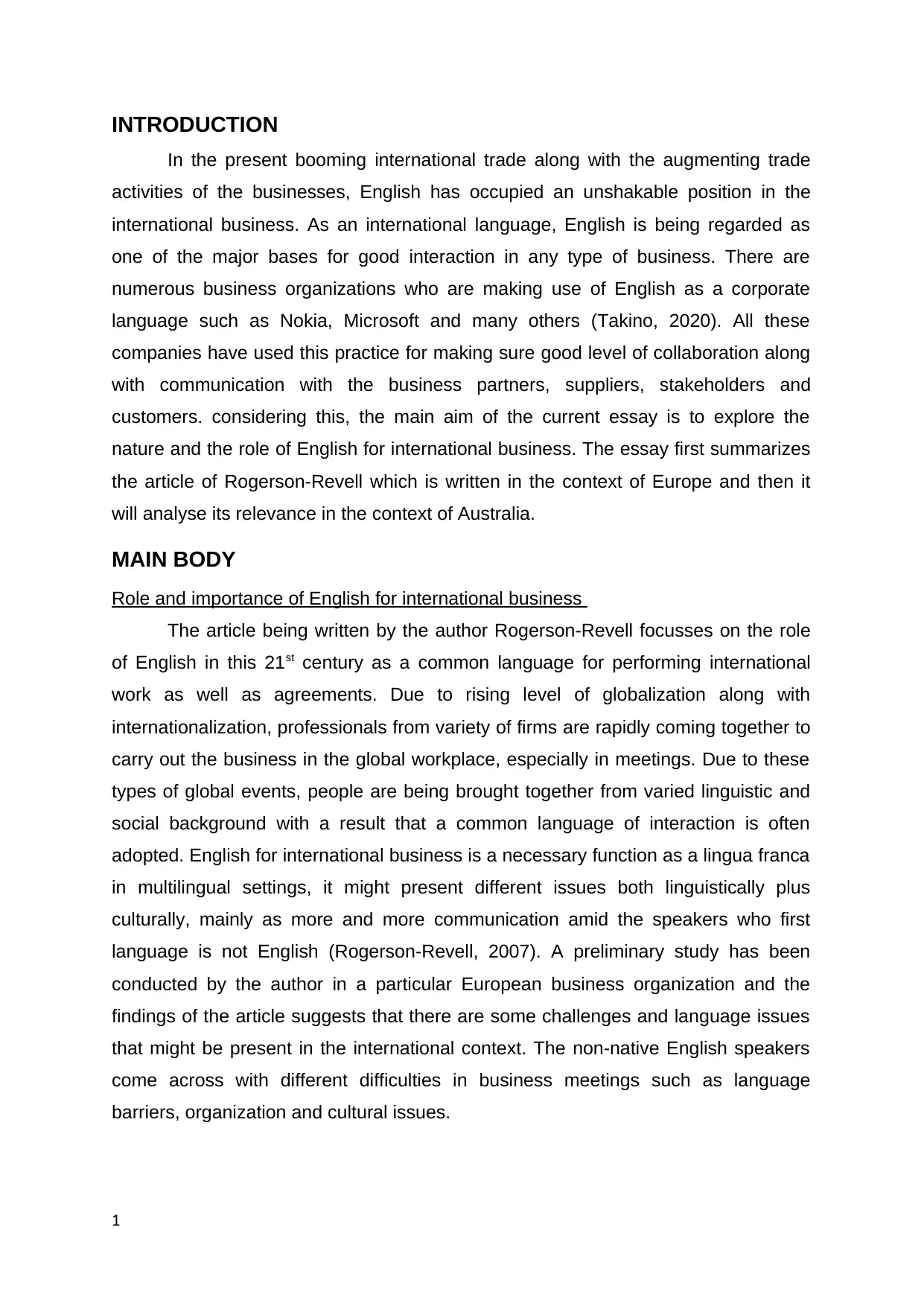
INTRODUCTION
In the present booming international trade along with the augmenting trade
activities of the businesses, English has occupied an unshakable position in the
international business. As an international language, English is being regarded as
one of the major bases for good interaction in any type of business. There are
numerous business organizations who are making use of English as a corporate
language such as Nokia, Microsoft and many others (Takino, 2020). All these
companies have used this practice for making sure good level of collaboration along
with communication with the business partners, suppliers, stakeholders and
customers. considering this, the main aim of the current essay is to explore the
nature and the role of English for international business. The essay first summarizes
the article of Rogerson-Revell which is written in the context of Europe and then it
will analyse its relevance in the context of Australia.
MAIN BODY
Role and importance of English for international business
The article being written by the author Rogerson-Revell focusses on the role
of English in this 21st century as a common language for performing international
work as well as agreements. Due to rising level of globalization along with
internationalization, professionals from variety of firms are rapidly coming together to
carry out the business in the global workplace, especially in meetings. Due to these
types of global events, people are being brought together from varied linguistic and
social background with a result that a common language of interaction is often
adopted. English for international business is a necessary function as a lingua franca
in multilingual settings, it might present different issues both linguistically plus
culturally, mainly as more and more communication amid the speakers who first
language is not English (Rogerson-Revell, 2007). A preliminary study has been
conducted by the author in a particular European business organization and the
findings of the article suggests that there are some challenges and language issues
that might be present in the international context. The non-native English speakers
come across with different difficulties in business meetings such as language
barriers, organization and cultural issues.
1
In the present booming international trade along with the augmenting trade
activities of the businesses, English has occupied an unshakable position in the
international business. As an international language, English is being regarded as
one of the major bases for good interaction in any type of business. There are
numerous business organizations who are making use of English as a corporate
language such as Nokia, Microsoft and many others (Takino, 2020). All these
companies have used this practice for making sure good level of collaboration along
with communication with the business partners, suppliers, stakeholders and
customers. considering this, the main aim of the current essay is to explore the
nature and the role of English for international business. The essay first summarizes
the article of Rogerson-Revell which is written in the context of Europe and then it
will analyse its relevance in the context of Australia.
MAIN BODY
Role and importance of English for international business
The article being written by the author Rogerson-Revell focusses on the role
of English in this 21st century as a common language for performing international
work as well as agreements. Due to rising level of globalization along with
internationalization, professionals from variety of firms are rapidly coming together to
carry out the business in the global workplace, especially in meetings. Due to these
types of global events, people are being brought together from varied linguistic and
social background with a result that a common language of interaction is often
adopted. English for international business is a necessary function as a lingua franca
in multilingual settings, it might present different issues both linguistically plus
culturally, mainly as more and more communication amid the speakers who first
language is not English (Rogerson-Revell, 2007). A preliminary study has been
conducted by the author in a particular European business organization and the
findings of the article suggests that there are some challenges and language issues
that might be present in the international context. The non-native English speakers
come across with different difficulties in business meetings such as language
barriers, organization and cultural issues.
1
⊘ This is a preview!⊘
Do you want full access?
Subscribe today to unlock all pages.

Trusted by 1+ million students worldwide
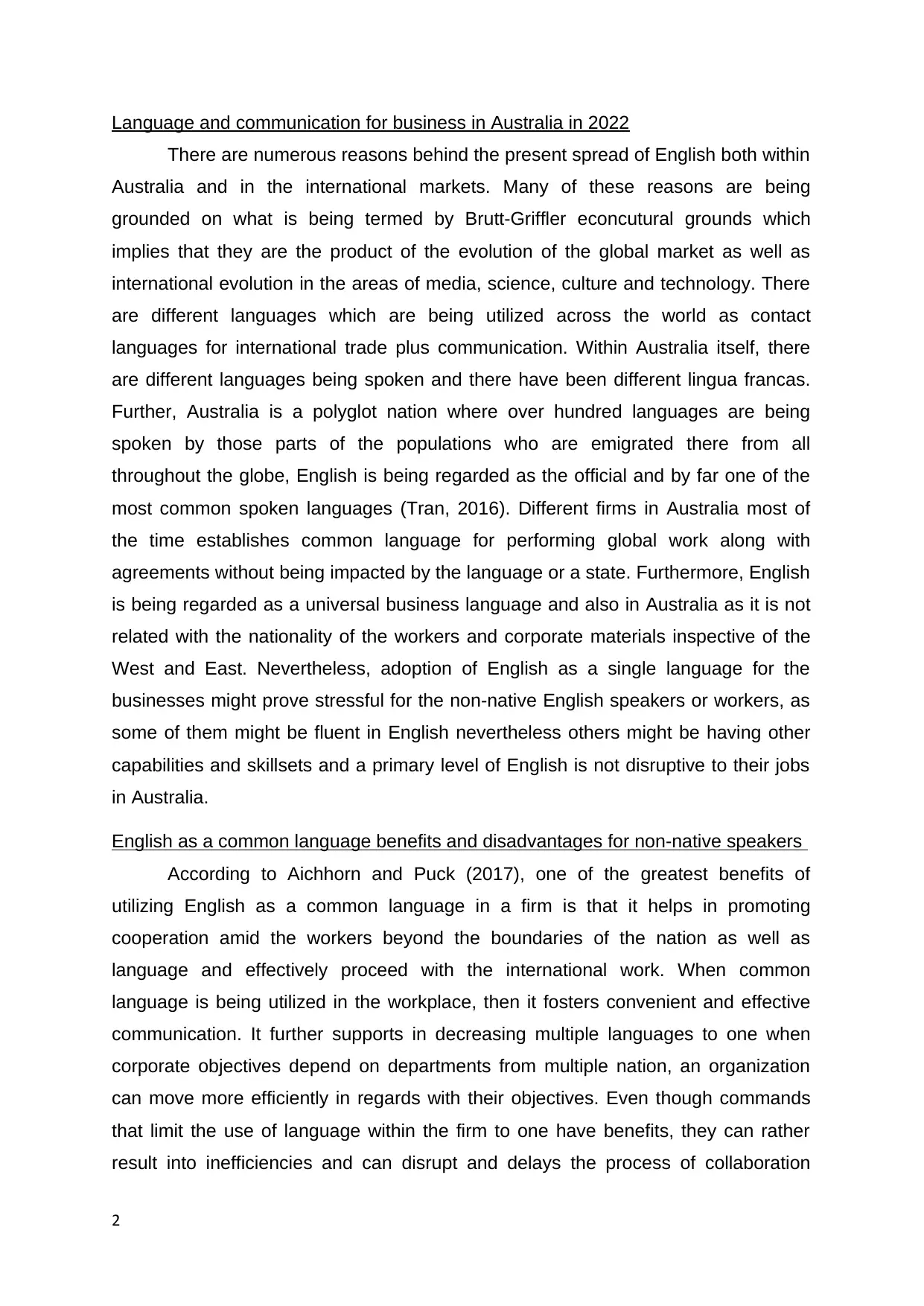
Language and communication for business in Australia in 2022
There are numerous reasons behind the present spread of English both within
Australia and in the international markets. Many of these reasons are being
grounded on what is being termed by Brutt-Griffler econcutural grounds which
implies that they are the product of the evolution of the global market as well as
international evolution in the areas of media, science, culture and technology. There
are different languages which are being utilized across the world as contact
languages for international trade plus communication. Within Australia itself, there
are different languages being spoken and there have been different lingua francas.
Further, Australia is a polyglot nation where over hundred languages are being
spoken by those parts of the populations who are emigrated there from all
throughout the globe, English is being regarded as the official and by far one of the
most common spoken languages (Tran, 2016). Different firms in Australia most of
the time establishes common language for performing global work along with
agreements without being impacted by the language or a state. Furthermore, English
is being regarded as a universal business language and also in Australia as it is not
related with the nationality of the workers and corporate materials inspective of the
West and East. Nevertheless, adoption of English as a single language for the
businesses might prove stressful for the non-native English speakers or workers, as
some of them might be fluent in English nevertheless others might be having other
capabilities and skillsets and a primary level of English is not disruptive to their jobs
in Australia.
English as a common language benefits and disadvantages for non-native speakers
According to Aichhorn and Puck (2017), one of the greatest benefits of
utilizing English as a common language in a firm is that it helps in promoting
cooperation amid the workers beyond the boundaries of the nation as well as
language and effectively proceed with the international work. When common
language is being utilized in the workplace, then it fosters convenient and effective
communication. It further supports in decreasing multiple languages to one when
corporate objectives depend on departments from multiple nation, an organization
can move more efficiently in regards with their objectives. Even though commands
that limit the use of language within the firm to one have benefits, they can rather
result into inefficiencies and can disrupt and delays the process of collaboration
2
There are numerous reasons behind the present spread of English both within
Australia and in the international markets. Many of these reasons are being
grounded on what is being termed by Brutt-Griffler econcutural grounds which
implies that they are the product of the evolution of the global market as well as
international evolution in the areas of media, science, culture and technology. There
are different languages which are being utilized across the world as contact
languages for international trade plus communication. Within Australia itself, there
are different languages being spoken and there have been different lingua francas.
Further, Australia is a polyglot nation where over hundred languages are being
spoken by those parts of the populations who are emigrated there from all
throughout the globe, English is being regarded as the official and by far one of the
most common spoken languages (Tran, 2016). Different firms in Australia most of
the time establishes common language for performing global work along with
agreements without being impacted by the language or a state. Furthermore, English
is being regarded as a universal business language and also in Australia as it is not
related with the nationality of the workers and corporate materials inspective of the
West and East. Nevertheless, adoption of English as a single language for the
businesses might prove stressful for the non-native English speakers or workers, as
some of them might be fluent in English nevertheless others might be having other
capabilities and skillsets and a primary level of English is not disruptive to their jobs
in Australia.
English as a common language benefits and disadvantages for non-native speakers
According to Aichhorn and Puck (2017), one of the greatest benefits of
utilizing English as a common language in a firm is that it helps in promoting
cooperation amid the workers beyond the boundaries of the nation as well as
language and effectively proceed with the international work. When common
language is being utilized in the workplace, then it fosters convenient and effective
communication. It further supports in decreasing multiple languages to one when
corporate objectives depend on departments from multiple nation, an organization
can move more efficiently in regards with their objectives. Even though commands
that limit the use of language within the firm to one have benefits, they can rather
result into inefficiencies and can disrupt and delays the process of collaboration
2
Paraphrase This Document
Need a fresh take? Get an instant paraphrase of this document with our AI Paraphraser
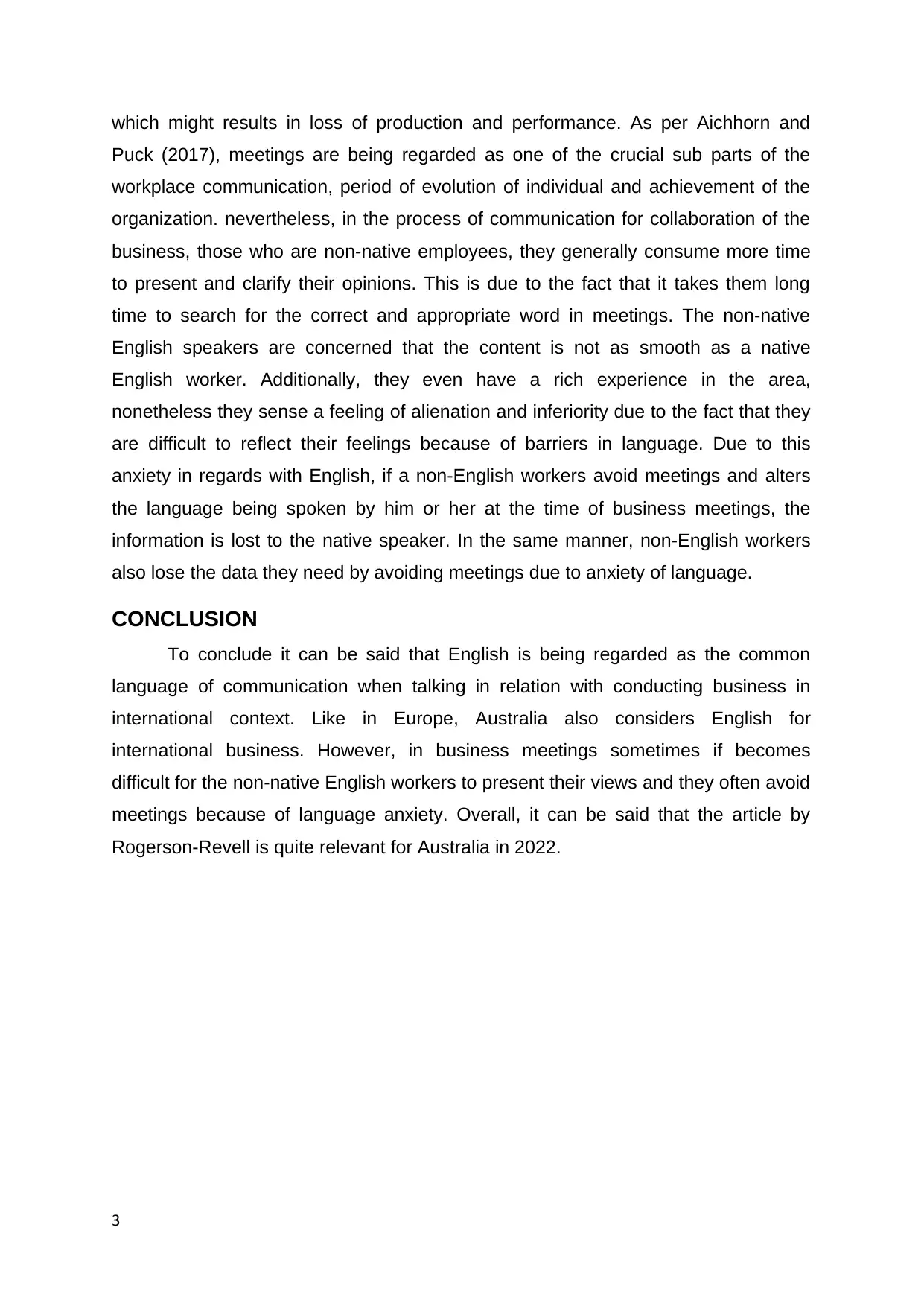
which might results in loss of production and performance. As per Aichhorn and
Puck (2017), meetings are being regarded as one of the crucial sub parts of the
workplace communication, period of evolution of individual and achievement of the
organization. nevertheless, in the process of communication for collaboration of the
business, those who are non-native employees, they generally consume more time
to present and clarify their opinions. This is due to the fact that it takes them long
time to search for the correct and appropriate word in meetings. The non-native
English speakers are concerned that the content is not as smooth as a native
English worker. Additionally, they even have a rich experience in the area,
nonetheless they sense a feeling of alienation and inferiority due to the fact that they
are difficult to reflect their feelings because of barriers in language. Due to this
anxiety in regards with English, if a non-English workers avoid meetings and alters
the language being spoken by him or her at the time of business meetings, the
information is lost to the native speaker. In the same manner, non-English workers
also lose the data they need by avoiding meetings due to anxiety of language.
CONCLUSION
To conclude it can be said that English is being regarded as the common
language of communication when talking in relation with conducting business in
international context. Like in Europe, Australia also considers English for
international business. However, in business meetings sometimes if becomes
difficult for the non-native English workers to present their views and they often avoid
meetings because of language anxiety. Overall, it can be said that the article by
Rogerson-Revell is quite relevant for Australia in 2022.
3
Puck (2017), meetings are being regarded as one of the crucial sub parts of the
workplace communication, period of evolution of individual and achievement of the
organization. nevertheless, in the process of communication for collaboration of the
business, those who are non-native employees, they generally consume more time
to present and clarify their opinions. This is due to the fact that it takes them long
time to search for the correct and appropriate word in meetings. The non-native
English speakers are concerned that the content is not as smooth as a native
English worker. Additionally, they even have a rich experience in the area,
nonetheless they sense a feeling of alienation and inferiority due to the fact that they
are difficult to reflect their feelings because of barriers in language. Due to this
anxiety in regards with English, if a non-English workers avoid meetings and alters
the language being spoken by him or her at the time of business meetings, the
information is lost to the native speaker. In the same manner, non-English workers
also lose the data they need by avoiding meetings due to anxiety of language.
CONCLUSION
To conclude it can be said that English is being regarded as the common
language of communication when talking in relation with conducting business in
international context. Like in Europe, Australia also considers English for
international business. However, in business meetings sometimes if becomes
difficult for the non-native English workers to present their views and they often avoid
meetings because of language anxiety. Overall, it can be said that the article by
Rogerson-Revell is quite relevant for Australia in 2022.
3
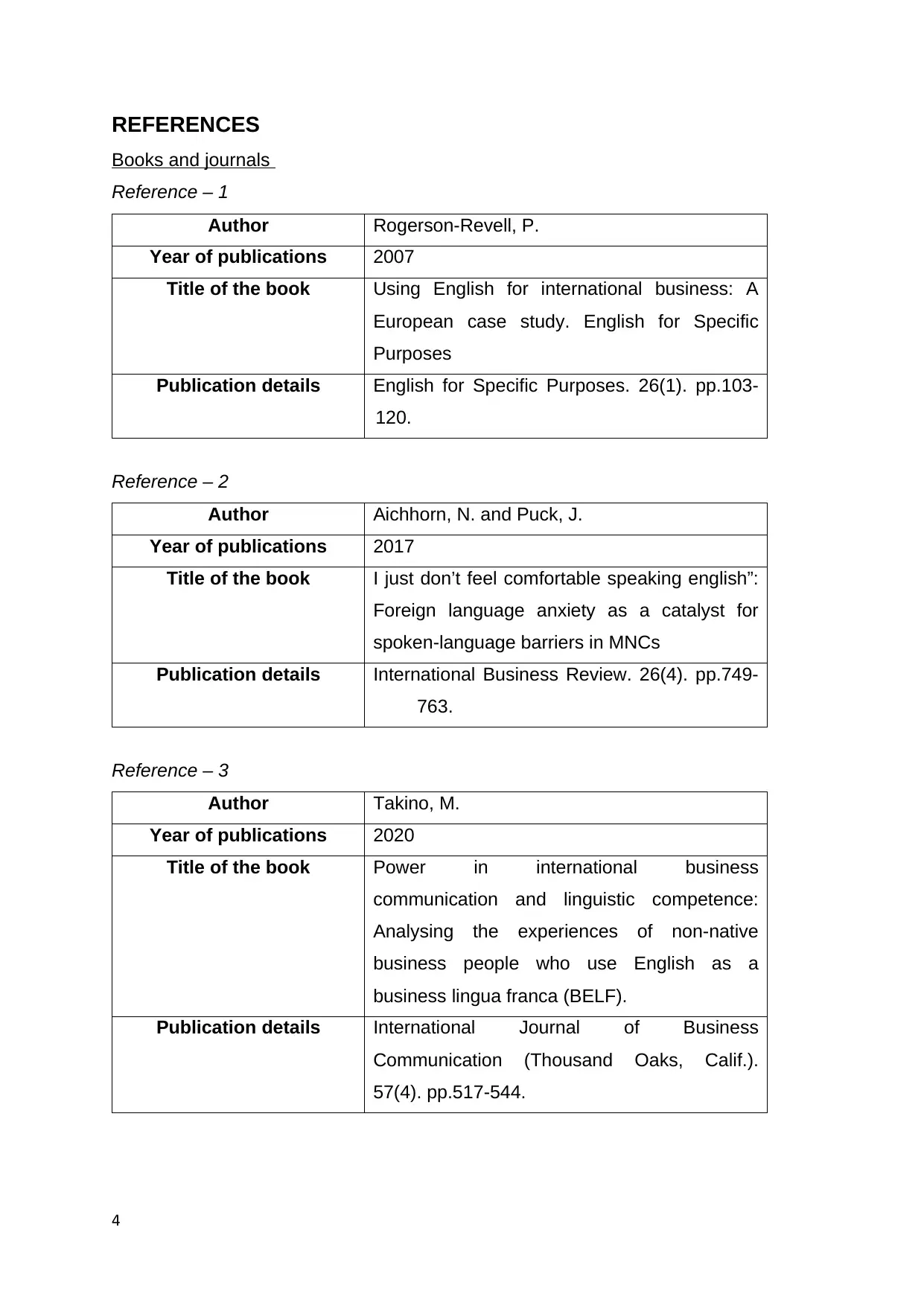
REFERENCES
Books and journals
Reference – 1
Author Rogerson-Revell, P.
Year of publications 2007
Title of the book Using English for international business: A
European case study. English for Specific
Purposes
Publication details English for Specific Purposes. 26(1). pp.103-
120.
Reference – 2
Author Aichhorn, N. and Puck, J.
Year of publications 2017
Title of the book I just don’t feel comfortable speaking english”:
Foreign language anxiety as a catalyst for
spoken-language barriers in MNCs
Publication details International Business Review. 26(4). pp.749-
763.
Reference – 3
Author Takino, M.
Year of publications 2020
Title of the book Power in international business
communication and linguistic competence:
Analysing the experiences of non-native
business people who use English as a
business lingua franca (BELF).
Publication details International Journal of Business
Communication (Thousand Oaks, Calif.).
57(4). pp.517-544.
4
Books and journals
Reference – 1
Author Rogerson-Revell, P.
Year of publications 2007
Title of the book Using English for international business: A
European case study. English for Specific
Purposes
Publication details English for Specific Purposes. 26(1). pp.103-
120.
Reference – 2
Author Aichhorn, N. and Puck, J.
Year of publications 2017
Title of the book I just don’t feel comfortable speaking english”:
Foreign language anxiety as a catalyst for
spoken-language barriers in MNCs
Publication details International Business Review. 26(4). pp.749-
763.
Reference – 3
Author Takino, M.
Year of publications 2020
Title of the book Power in international business
communication and linguistic competence:
Analysing the experiences of non-native
business people who use English as a
business lingua franca (BELF).
Publication details International Journal of Business
Communication (Thousand Oaks, Calif.).
57(4). pp.517-544.
4
⊘ This is a preview!⊘
Do you want full access?
Subscribe today to unlock all pages.

Trusted by 1+ million students worldwide
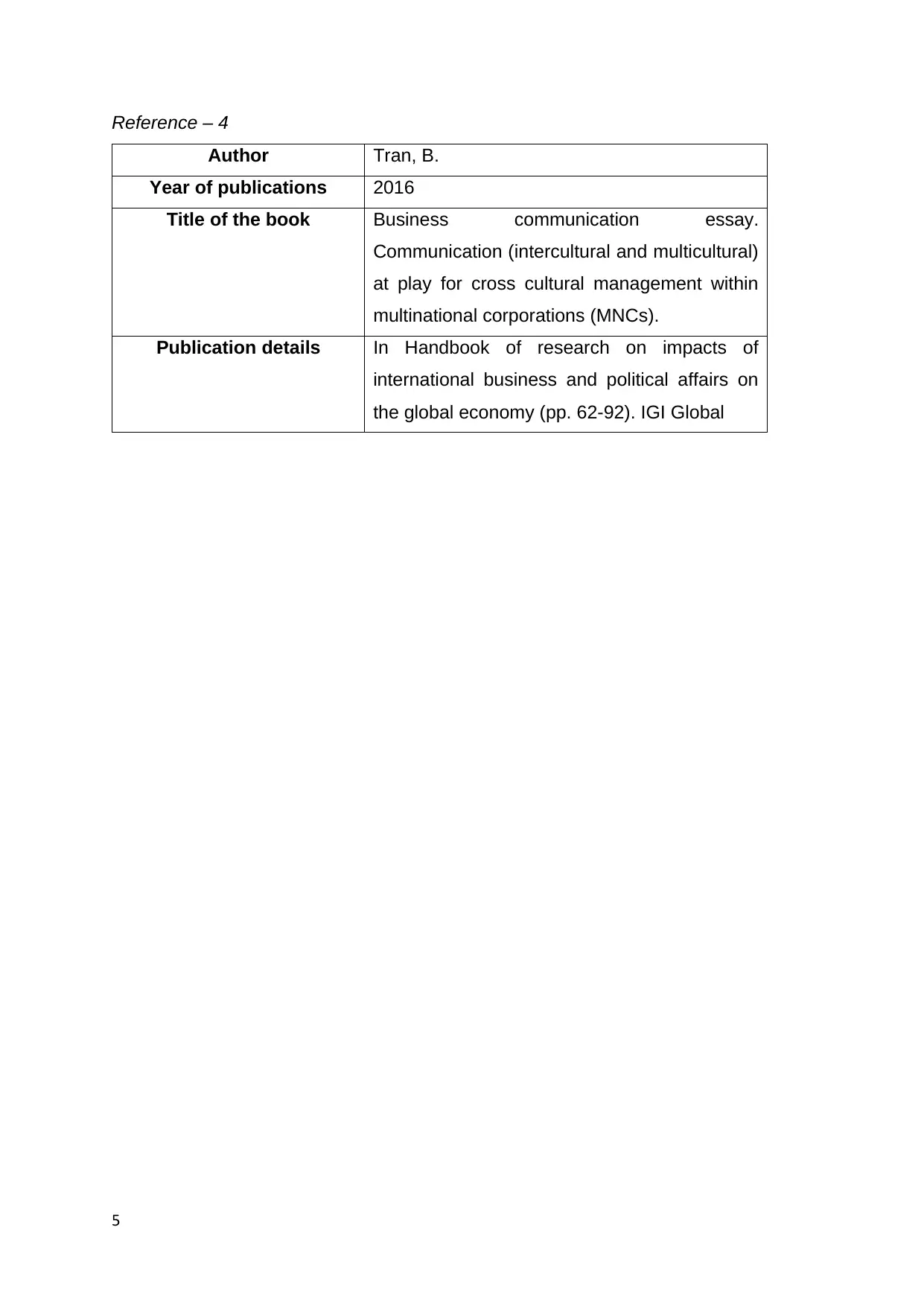
Reference – 4
Author Tran, B.
Year of publications 2016
Title of the book Business communication essay.
Communication (intercultural and multicultural)
at play for cross cultural management within
multinational corporations (MNCs).
Publication details In Handbook of research on impacts of
international business and political affairs on
the global economy (pp. 62-92). IGI Global
5
Author Tran, B.
Year of publications 2016
Title of the book Business communication essay.
Communication (intercultural and multicultural)
at play for cross cultural management within
multinational corporations (MNCs).
Publication details In Handbook of research on impacts of
international business and political affairs on
the global economy (pp. 62-92). IGI Global
5
1 out of 7
Related Documents
Your All-in-One AI-Powered Toolkit for Academic Success.
+13062052269
info@desklib.com
Available 24*7 on WhatsApp / Email
![[object Object]](/_next/static/media/star-bottom.7253800d.svg)
Unlock your academic potential
Copyright © 2020–2026 A2Z Services. All Rights Reserved. Developed and managed by ZUCOL.





